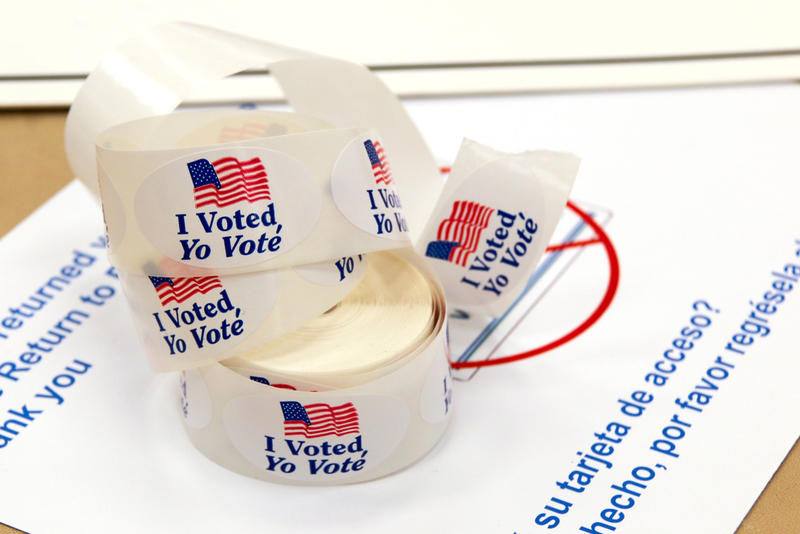Red or Blue? Election Day Looms in VA
Photo by: creative commons
The gubernatorial election in Virginia is shaping out to be one of the most-watched elections since the Trump administration left office.
A person sits down on their couch, rests their feet up and turns on the television to watch the latest episode of their favorite reality TV show. Political campaign ads start playing in a repetitive cycle, ranging from Republican attorney general nominee Jason Miyares pledging to fight for patriotic freedom, to the Democratic lieutenant governor nominee Hala Ayala painting her opponent Winsome Sears as a danger to Virginia. These ads have circulated around news channels, social media websites, even billboards for countless weeks now, ramping up for the upcoming election.
The Trump administration has been out of office since January 2021, yet much hostility remains between the Democrats and the Republicans, specifically in Virginia. Former governor and Democratic nominee for the gubernatorial race, Terry McAuliffe, has repeatedly criticized Youngkin for his brazenly conservative views on McAuliffe’s campaign ads that are shown every hour of the day, while Youngkin practices similar tactics in hopes of claiming the state of Virginia.
Since 2017, according to Karina Elwood from the Washington Post, there has been a spike in voter turnout in Virginia, but Democrats fear that this energy is gone. Many prominent Democrats, including Barack Obama, Stacey Abrams and Hillary Clinton, all flew to Virginia on Sunday to endorse McAuliffe, the lieutenant governor nominee Hala Ayala, and the attorney general nominee Mark Herring. Abrams warned Virginians that the Commonwealth could look like Texas when it comes to women’s rights and voter’s rights.
McAuliffe, Ayala and Herring are aiming to fight against voter fatigue by attacking the very same views that encouraged Virginians to go out and vote in the last four years. “Glenn Youngkin will fight for Trump. I’ll fight for you,” says McAuliffe on Twitter.
Bruce Carlson, who lives in Winchester, told The Washington Post’s Marc Fisher that he considers himself to be a Democrat, but will be voting for Youngkin this election, “Public schools are pushing a radical agenda in which American history is being portrayed as racist.”
Critical race theory and the rights of transgender students seem to be the top contenders for Virginians voting red this year. State Republicans are eyeing this vulnerability and have pulled enough money to reach out to voters; especially trying to garner the support of moderate Republicans who are still traditionally conservative, but voted for Biden in November as a result of their frustration over Trump’s behavior.
Former U.S. Representative Tom Davis who represented Northern Virginia in the chamber for 14 years highlights the switch among Virginian voters, “People voted for Biden to get Donald Trump out of their living room, but they did not vote for all this stuff that Biden is bringing with him, and I think [Virginians] are going to pump the brakes.”
The nominees both wish to bring a new and fresh start to Virginia. The Republican nominee Glenn Youngkin considers himself to be a political outsider, hoping his charm will sway voters into turning Virginia back into a red state. He has not accepted Trump’s endorsement publicly, although he admits that Trump represents much of his platform, and has focused his attention more on gaining the vote of moderate Republicans.
Youngkin refuses to go into depth about his views regarding abortion and the second amendment, but a tape released in July of this year shows Youngkin saying he is “staunchly and unabashedly pro-life.”
Youngkin states that Virginians “need a governor who can create jobs, keep businesses from leaving, and create a rip-roaring economy that lifts all Virginians.” He promises to protect and defend Virginians’ constitutional rights and personal liberties, which he says are “being threatened like never before.”
Democratic gubernatorial nominee Terry McAuliffe notes that Youngkin is “nothing more than a Trump loyalist.” McAuliffe was governor of Virginia from 2014 to 2018, when, according to his website, he brought 200,000 good paying jobs to the Commonwealth and drove unemployment down.
He is pro-choice, vetoing anti-abortion legislation when he was in office, and granted 200,000 convicted felons the right to vote in April of 2016.
If McAuliffe were to be elected, he promises to protect women’s rights and invest in education, enacting legislation that would raise teachers’ salaries and granting all Virginia students access to broadband internet.
According to the latest polls, McAuliffe is above Youngkin by three percentage points; however, that could change any day leading up to Election Day. There are no polls for the lieutenant governor or attorney general races.
The gubernatorial election is simply not the only statewide election that is imperative to vote in in Virginia. Lieutenant governor and attorney general elections are also on the 2nd; they are just as equally important.
Election Day for Virginians is on Nov 2. Be sure to tell the adults around you to vote, regardless of their political affiliations.


